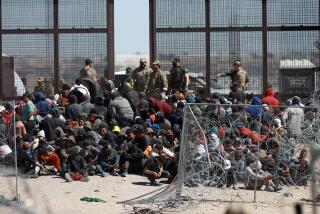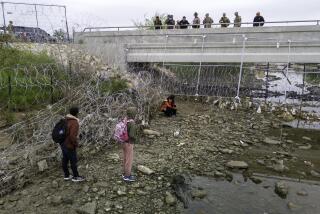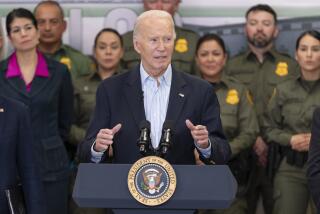A heartfelt lament on patrolling the border: Francisco Cantu’s ‘The Line Becomes a River’
Francisco Cantú’s “The Line Becomes a River” is a book about the U.S.-Mexico border. Given how fraught the topic has become, it’s worth being crystal-clear right away about what the book is, and isn’t.
It is not a book about President Trump’s proposed border wall and who will pay for it. It is not about the people who think such a wall is a good idea or those who find the idea racist, expensive and pointless. Though it is about the U.S. Border Patrol, where Cantú served from 2008 to 2012, it is not a rigorous investigation of its operations. It is critical of the agency, but it is not an indictment of it. It is a lament for what a broken immigration system does to families, and its final third is a riveting, heartbreaking exploration of one such case. But it contains no policy guidance on how to fix the problem.
Mostly, “The Line Becomes a River” is about Cantú himself. That’s not to say he is narcissistic or blind to the scope of his subject. Indeed, one of the lessons he learned from his stint with the Border Patrol is how quickly the border strips migrants of their identity and how that loss of identity has toxic consequences — when we dismiss migrants collectively as “illegals,” they become easier to mistreat and dismiss. By sorting out his own humanity, Cantú’s thinking goes, he might better appreciate others’.
It is a lament for what a broken immigration system does to families.
He can’t claim complete success — the book is marked by an enlightened but defeated tone — but he began with good intentions. “I want to be on the ground, out in the field, I want to see the realities of the border day in and day out,” he tells his mother. Mom, a retired U.S. Park Ranger and daughter of a Mexican immigrant, isn’t having it: “The Border Patrol isn’t the Park Service. It’s a paramilitary police force.”
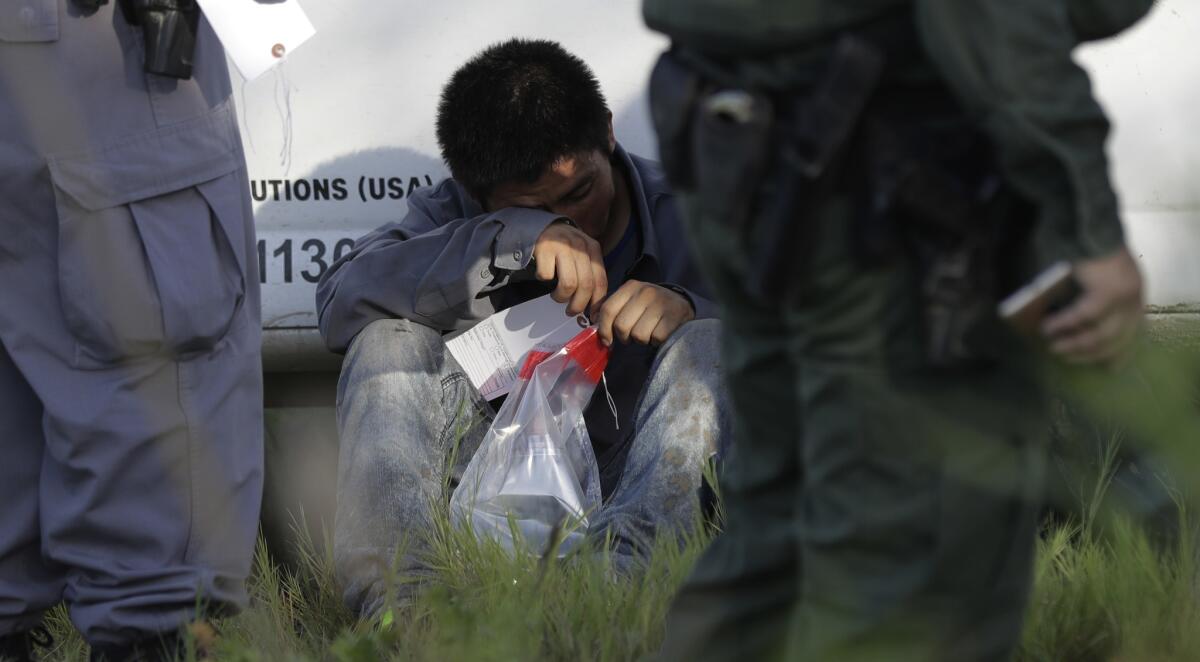
Mom’s words cast a shadow on the ensuing pages. Working as a field agent near the Mexico border in the Arizona and New Mexico region — Cantú is deliberately vague about exactly where — he learns quickly that clear-cut pronouncements about the border fall apart. The region is populated with drug smugglers as well as people desperate to escape the violence of the Mexican cartels; by-the-book policing of either swiftly becomes impossible. They could chase down the drug-runners who’ve abandoned their loads, but why deal with all the paperwork? What guideline would tell Cantú to help a deported shirtless migrant by literally giving him the shirt off his back, as he does? The sight of two preteen girls found in the desert gnaws at him. The relationship between agents and border crossers is, at best, a messy détente.
At worst, the agents use deterrence methods that are aggressive and inhumane: “It’s true that we slash their bottles and drain their water into the dry earth,” he writes, “that we dump their backpacks and pile their food and clothes to be crushed and pissed on and stepped over, strewn across the desert and set ablaze.” (Last month, a migrant-aid group that places water stations in the desert accused the Border Patrol of destroying them.)
I had little inkling of what happened to those I arrested after I turned over their paperwork and went home from my shift.
— Francisco Cantú
But threats won’t work, nor will walls, nor will direct persuasion: When Cantú tells one migrant, exhausted from travel, that the border can be ugly, he responds, “pero es aún más feo donde nosotros vivimos” (italics added) — but it is even uglier where we live. Cantú is consumed by dreams you needn’t recruit Freud to interpret: lost teeth, rapacious wolves, empty boxes, faceless men. He grinds his teeth. “It’s getting kind of ugly in there,” his dentist tells him.
Still, like many Border Patrol agents, Cantú rose through the ranks quickly, advancing to a command center in Tucson, before he quit, disheartened. The intractability of the problem grated on him, as did the casual racism: “I need to know who’s a scumbag and who’s just a POW,” one staffer tells him. “A plain old wet.”
In the book’s final section, which takes place after he left the Border Patrol and was enrolled in graduate school, he writes of working in a coffee shop when an undocumented coworker, José, was apprehended after going to Mexico for his mother’s funeral. Cantú’s attempts to help introduce him to a host of bureaucratic agonies: José’s wife can’t visit him in the detention center for fear she’ll be arrested herself, legal help is expensive and a stack of character-witness letters must do battle with a justice system inclined to deport.
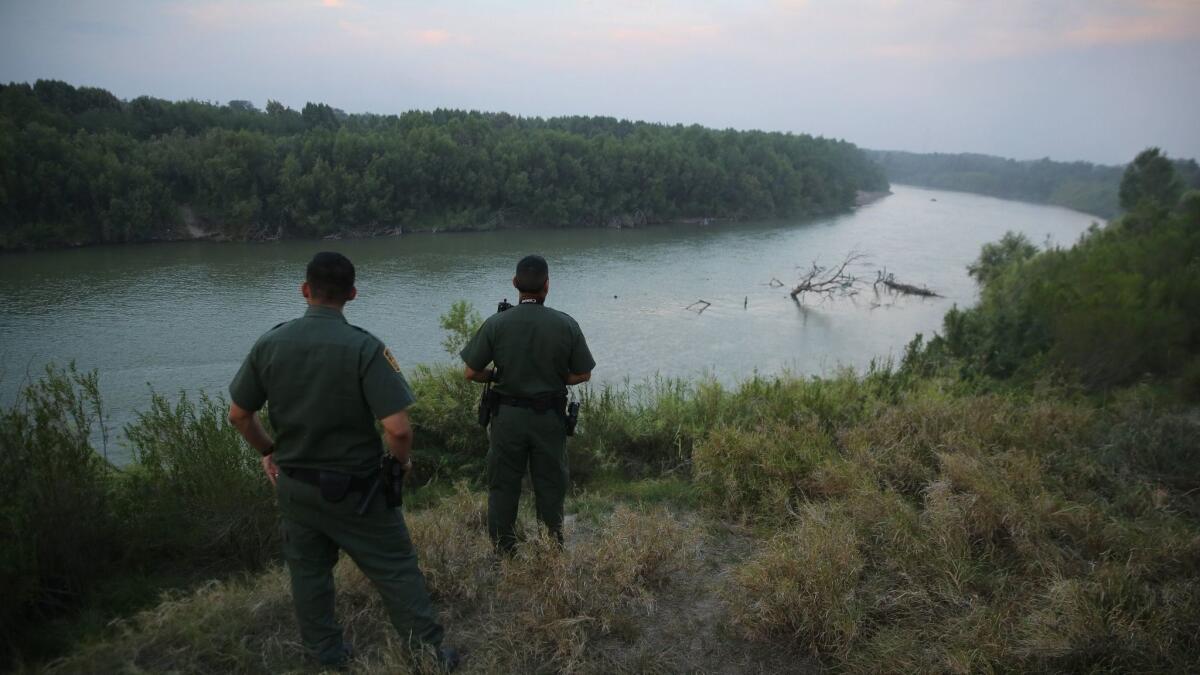
It’s a moment of reckoning for Cantú: “I had little inkling of what happened to those I arrested after I turned over their paperwork and went home from my shift.” It’s a candid statement, but also a frustrating one: Did his eagerness to understand the border at the ground level not move him to better understand how the detention and deportation process functioned? His lyrical asides about the border, from the history of its creation to quotations of poets who’ve written about it, are passionately delivered and speak to his urge to give nameless migrants an identity. But he spends less time scrutinizing the institutions that create the namelessness. His discussion of the Mexican government’s bloody escalation of the war against the cartels only glancingly mentions the U.S. government’s implication in it or the way border crackdowns only made crossing the border more expensive and risky.
The imperfection of Cantú’s approach, though, mirrors the messiness of the crisis he’s facing. A more hard-nosed report in the style of the late investigative reporter Charles Bowden might expose squandered resources, corruption and broken policy; a more intimate memoir like Reyna Grande’s “The Distance Between Us” would have a stronger emotional pull. Cantu’s struggle to do right by both themes is, if not surmounted, at least palpable. He recalls telling José that he arrested a few low-level narcos with the Border Patrol, then concedes, resigned, what his main job was. “Mostly I arrested migrants, I confessed,” he writes. “People looking for a better life.”
Athitakis is a reviewer in Phoenix.
“The Line Becomes a River: Dispatches From the Border”
Francisco Cantú
Riverhead: 256 pp., $26
More to Read
Sign up for our Book Club newsletter
Get the latest news, events and more from the Los Angeles Times Book Club, and help us get L.A. reading and talking.
You may occasionally receive promotional content from the Los Angeles Times.
